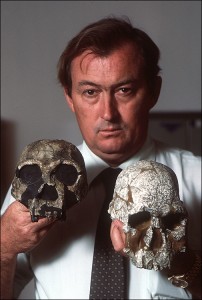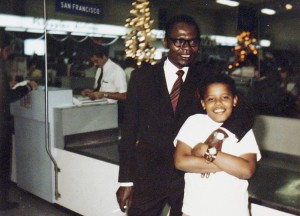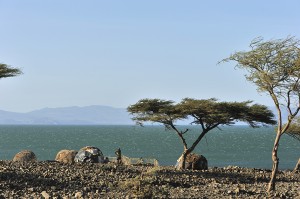Remembering Richard Leakey
Thursday, January 13th, 2022
Kenyan-born paleoanthropologist Richard Leakey and his team discovered many prehistoric human fossils at Lake Turkana, Kenya. In this photograph, he is holding near-complete fossil skulls of Homo erectus, left, and Homo habilis, right.
Credit: © Chip Hires, Gamma-Rapho/Getty Images
Famed scientist, conservationist, and politician Richard Leakey passed away aged 77 on Jan. 2, 2022 at his home outside Nairobi, Kenya. The remarkable fossils of prehistoric human ancestors discovered by Leakey and his colleagues firmly established the origins of humanity in Africa.
Richard Erskine Frere Leakey was born on Dec. 19, 1944 in Nairobi. He was the son of distinguished British anthropologists Louis and Mary Leakey, whose excavations at Olduvai Gorge in northern Tanzania uncovered fossils of an early human ancestor they named Homo habilis. Louis Leakey argued that Homo habilis was one of the earliest types of human beings. Other scientists were skeptical, thinking that our own species likely originated in other regions.
As a child, Richard grew up at excavation sites in Olduvai Gorge run by his parents. As a rebellious teen, however, Richard Leakey was determined to stay out of the “family business” of searching for fossils of early human ancestors. He dropped out of school and worked for a time leading safaris. While flying his own airplane over a region of northern Kenya around Lake Turkana, he recognized landscapes that likely held abundant fossils. Leading his own team of fossil hunters, Richard discovered several fossils of human ancestors, including a nearly complete skull that he recognized as Homo habilis. This species is now considered by most anthropologists to be one of the earliest types of human beings. Homo habilis lived in Africa about 2 million years ago.
In 1984, a member of Leakey’s team, Kamoya Kimeu, found an almost complete skeleton of a young man at a site called Nariokotome near Lake Turkana that dates about 1.6 million years ago. The skeleton was classified in the species Homo erectus, a prehistoric human ancestor known from fossils first discovered in the 1800’s in Asia and later in Europe. The well-preserved fossil skeleton demonstrates that Homo erectus had a larger brain compared to Homo habilis, and first appeared in Africa. The more intelligent Homo erectus was able to adapt to new environments and migrate out of the ancestral African homeland.
From 1968 to 1989, Richard directed the National Museums of Kenya while he and his team continued fieldwork in the Lake Turkana region, discovering many important fossils of human ancestors. From 1990 to 1994, and briefly again in 1998, he headed the Kenya Wildlife Service (KWS). In that position, he worked to eliminate the illegal killing of Kenyan elephants for their tusks, a source of ivory. In 1995, Leakey helped found a Kenyan political party called Safina, to challenge the ruling Kenya African National Union (Kanu) party.
Since 2002, Leakey has been a professor of anthropology at the State University of New York at Stony Brook. There, he led the Turkana Basin Institute responsible for continuing fieldwork in the Lake Turkana region. In 2004 he founded the conservation organization WildlifeDirect and also returned as head of the KWS from 2015 until 2018.





